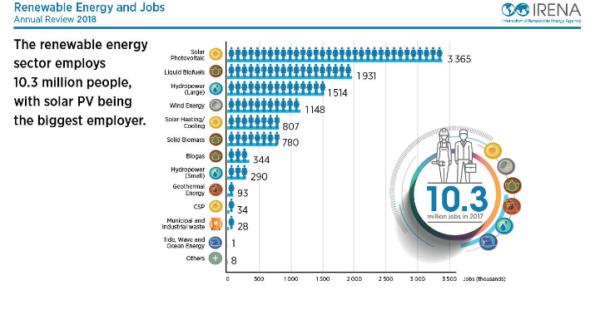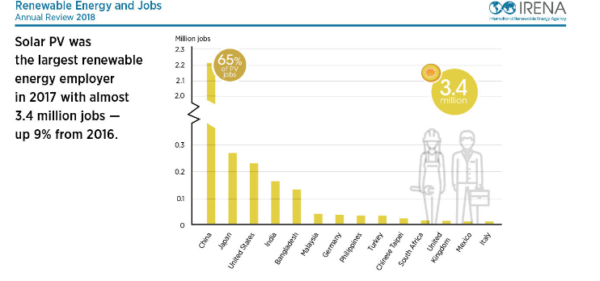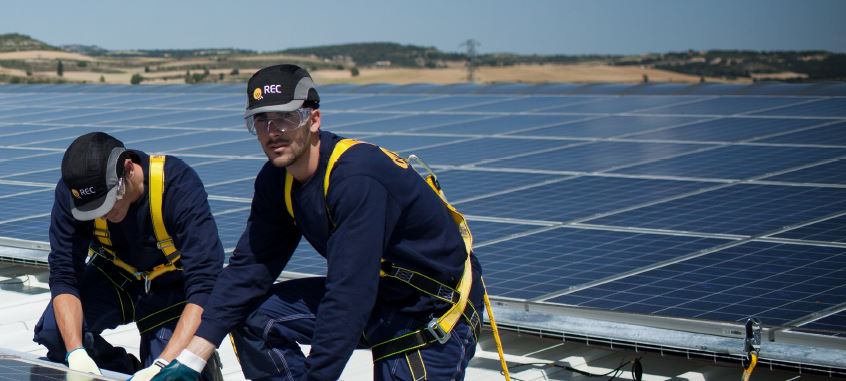Good news has come in for both renewables and the economy, as the number of jobs in the renewable energy sector continues to rise on the back of a strong growth in Asia.
According to the latest figures released by the International Renewable Energy Agency (IRENA), the clean energy industry added more than 500,000 jobs in 2017, to reach a total of 10.3 million worldwide.

The solar PV industry has remained the largest employer among all renewable energy technologies, providing 3.4 million jobs, up almost 9% from 2016, following a record 94 GW of installations in 2017.
Geographically, 65% of all solar PV jobs are located in China, which is equivalent to 2.2 million and represents an expansion of 13% over the previous year.
Despite a slight drop, Japan and the U.S. came in second and third among the largest markets for solar PV employment in the world, followed by India and Bangladesh. Currently, the top five account for around 90% of global solar PV jobs.

Overall, China, Brazil, the U.S., India, Germany and Japan remained the world’s biggest renewable energy employers, representing more than 70% of all industry jobs globally.
While the number of countries that enjoy the socio-economic benefit of renewables is on the rise, there are relatively few countries where manufacturing activities take place.
Namely, 60% of all renewable energy jobs are in Asia, finds the fifth edition of Renewable Energy and Jobs – Annual Review, launched at IRENA’s 15th Council in Abu Dhabi.
“The data also underscores an increasingly regionalized picture, highlighting that in countries where attractive policies exist, the economic, social and environmental benefits of renewable energy are most evident,” said Adnan Z. Amin, IRENA Director General.
“Fundamentally, this data supports our analysis that decarbonization of the global energy system can grow the global economy and create up to 28 million jobs in the sector by 2050.”
Other renewables
Helping to pass the 10 million milestone for the first time ever, biofuels stood out as the second largest employer in the renewable energy sector with 1.9 million jobs, 41% of which are concentrated in Brazil.
Large hydropower came in third with as many as 1.5 million jobs, 63% of which are in operation and maintenance and more equally distributed across the globe.
The wind industry was the fourth biggest employer in the clean energy sector, although the number of jobs slightly contracted in 2017 to 1.15 million.
IRENA notes that while wind jobs are found in a relatively small number of countries, the degree of concentration is lower than in the solar PV sector, as China accounts for 44% of global wind employment, followed by Europe and North America with 30% and 10%, respectively. According to IRENA, Europe accounts for five of the world’s top ten countries for installed wind power capacity.
“By providing policy makers with this level of detail about the composition of renewable energy employment and skills requirements, countries can make informed decisions on several important national objectives, from education and training, to industrial policies and labour market regulations,” said Dr. Rabia Ferroukhi, Head of IRENA’s Policy Unit and Deputy Director of Knowledge, Policy and Finance.
“Such considerations will support a fair and equitable transition to a renewables based energy system.”
This content is protected by copyright and may not be reused. If you want to cooperate with us and would like to reuse some of our content, please contact: editors@pv-magazine.com.




2 comments
By submitting this form you agree to pv magazine using your data for the purposes of publishing your comment.
Your personal data will only be disclosed or otherwise transmitted to third parties for the purposes of spam filtering or if this is necessary for technical maintenance of the website. Any other transfer to third parties will not take place unless this is justified on the basis of applicable data protection regulations or if pv magazine is legally obliged to do so.
You may revoke this consent at any time with effect for the future, in which case your personal data will be deleted immediately. Otherwise, your data will be deleted if pv magazine has processed your request or the purpose of data storage is fulfilled.
Further information on data privacy can be found in our Data Protection Policy.